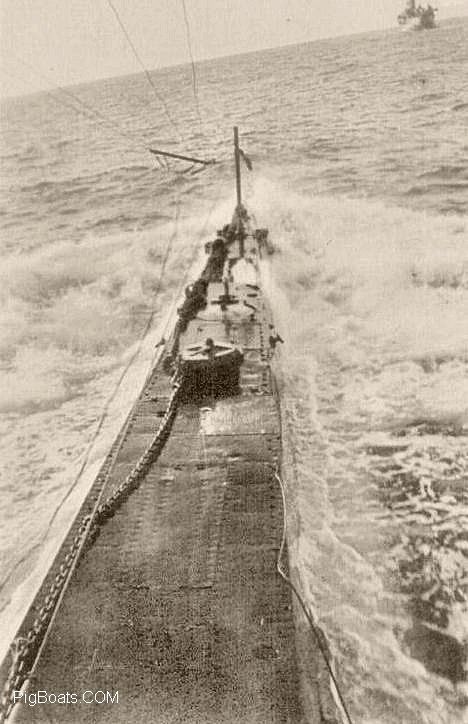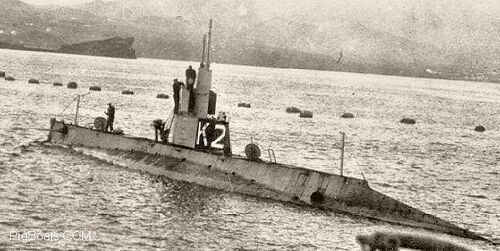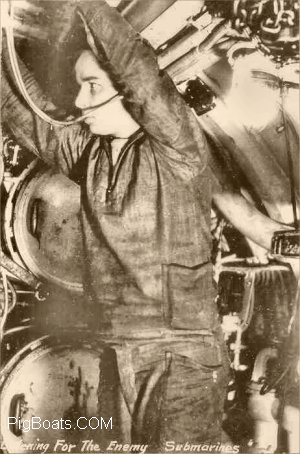Boomerang
Boomerang
An Original Fiction Story Written just Post WW I by Norman McKinnon, a Radioman aboard the USS K-2. The Story is submitted by grandson Cliff Leverette and is Copyright by him. This story has never been publish before and PigBoats.COM has the honor of doing that.
Though this is fiction it gives good insight into early "sonar" operations and submarine capabilities.
The author cast himself into the story as "Sandy McNutt".

By Norman McKinnon / Cliff Leverette 2002©
As far as the eye could see, stretched a quiet ocean, bounding on all sides by blue sky, with small patches of white clouds loafing lazily along. Somewhere to the eastward, several hundred miles away, was the now famous seaport, Brest, destination of many transports carrying the newly trained American soldiers. Surely danger could not lurk here! Suddenly a slender moving object emerged, leaving a V shaped wake behind which was outlined by foam and small waves. It's appearance could have caused considerable excitement on board surface vessels, but none were nearby.
In the conning tower, or control room, of the submarine, whose periscope had just appeared, an officer had his eyes glued to the periscope. His cap showed that he was a first lieutenant, U.S.N. Standing at his side, with eyes on the instrument boards, was the Lieutenant Commander, who was in command. Each officer was garbed in dungarees as were all of the crew. In answer to a question, the Lieutenant reported that all was clear and that it would be safe to come to the surface.
"Make sure that there isn't any smoke on the horizon. Those cussed destroyers of ours might spot us and toss a few shells our way. And the blooming armed guard crews on the transports believe in shooting first and then in asking questions." ordered the Commander.
Still carefully looking through the periscope, the second in command answered, "Aye, Aye, Sir! Our ships have nearly gotten me gray haired. I always feel like the old gentleman wearing a top hat, walking down through the gas house district after a snowstorm. I think we are safe this time, Sir."
Instead of continuing the conversation, the commander issued the required orders, which were quickly obeyed. There was very little sound inside the submarine, as all the men stood at their stations, performing their duties. Only the hum of the electrically operated motors broke the silence. Following the command to, "Blow ballast tanks", the swish of sound increased as the compressed air forced the water from the ballast tanks located in the outer hull. The diving rudders having been properly adjusted, the submarine was soon running on the surface. The motors were stopped and the Diesel engines took up their work.
The conning tower and deck hatches were opened and officers and men began to appear. Word was passed that all those on the deck could smoke, if they wished. Only the quartermaster at the deck wheel and the deck officer were alert, all others relaxing and enjoying the nice pure air. Of course there were several men still on duty below, but they would soon be relieved.

"I sure was dying for a smoke," said a radio man who was called "Sparks".
"Me too," replied a red headed sailor, who was also a radio operator and who was naturally called "Sandy" because his hair was that color of red. "It get kinda stuffy down there, don't it?"
"It sure does," agreed Sparks, "But it ain't as bad as not washing or shaving. I feel so sticky and dirty. Even if my whiskers ain't so much, still in eight days they sure show up."
"Aw, you will get used to that. Just remember you ain't got a lot of white clothes to wash, nor fifty-seven varieties of inspections to stand."
"If I thought I could get away with it I would snitch enough fresh water to wash my face, That salt water makes if feel so funny."
"You know that is a court-martial offense. All that fresh water is needed for the batteries, drinking water and cooking. The Captain means business and you would be crazy to take a chance when we still go into port in a couple of days," admonished Sandy.
"Guess you're right. Speaking of German subs, which we were not. I copied some code a little while ago and the Old Man is decoding it," said Sparks, "guess I better go below and get the old ear phones on again. See you later."
Sandy, left to himself, sat on the deck and let his thoughts wander. Life is funny. Only a little over a year ago, at the age of eighteen, he had enlisted in the Navy. To a young friend who had asked what he was going to be, he flippantly replied, "A deck hand on a submarine." Of course, in his ignorance he knew that a submarine wouldn't have deck hands. Fate had put him aboard a submarine and he knew now that submarines did have deck hands. His wisecrack had come home to roost.
His thoughts were rudely interrupted by the Deck Officer, who ordered him below to the control room. Here he found the Captain who told Sandy that the message, that he had just decoded, reported an enemy submarine in their vicinity.
"McNutt," said the Captain, addressing Sandy, "We are going to get a chance to try out that new listening device that was put on when we were in dry dock a few weeks ago. You are a qualified listener, are you not?"
"Yes, Sir, I went through the Listener's School at New London," answered Sandy. "The Oscillator and the Microphone are O.K. Of course we will have to submerge and lay in wait. If our propellers are moving they will make so much noise that I will not be able to hear through my Stethoscope. Also, the enemy can hear us."
The Captain ordered all men to their diving stations and then gave the order to dive. After seeing that the wireless mast and the toilet were secured against the outside pressure, Sandy carefully examined the salt water seepage around the Giant Exide batteries. When this got above a certain level, it had to be forced out. Should it get in the batteries it would make the deadly Chlorine Gas and death would result for all the crew. Everything was O.K.
After running for a considerable time, the motors were stopped and Sandy put the stethoscope to his ears. They were like the ones the doctor used when he listened to a man's heart and lung action, only these would pick up a propeller sound to a distance of five miles. Alternately listening and then moving, time passed slowly.

Suddenly Sandy sat erect and tense. There was a slight sound in his right ear. It gradually increased until he could distinguish, not just one, propeller, but several. His training indicated that there were ships running on the surface. Bringing the wheel of his instrument around until the sound was equally loud in each ear, he indicated to the Captain the arrow that showed in what direction the sound came from. In answer to the Captain's question, Sandy said, "I can hear the rapidly moving propellers of both destroyers and sub chasers. As a back ground, I can hear the slower propeller of the transports. We will have to lie quiet until they pass, Some of them have listening devices and if they should 'heave to', they would hear us, Sir."
"If they heard us they would drop depth bombs all around us and it would be curtains for us. When you can't hear any propeller action we will proceed."
"Aye, Aye, Sir!" replied Sandy. Listening, the sound grew to a roar. The convoy was passing within a mile of the hidden submarine. A tense silence enveloped the men in the submarine.
Being submerged is never a commonplace matter and each man was hoping that they would get out of this tight spot, without any trouble. All the sailors had great respect for the "Depth Charges", facetiously called "Ash Cans", but none so much as the submarine man. Well, they knew, that those ash cans had cleared a path to France, that would otherwise have been a death trap for multitudes of soldiers and sailors.
Sparks was thinking about the maneuvers around Block Island, a year before. Something had gone wrong with the little gyroscope that held the practice torpedo on its course and it had circled back and hit the submarine, but of course, the war head containing the explosive charge and firing pin was not on, only the training head. No one had ever satisfactorily explained how it happened. Something must have happened to the steering engine, or to the rudders. He looked at the long, cigar shaped cylinders with respect. They were all over fourteen feet long, and nearly a ton each. They were made of specially prepared steel and divided into three compartments, the war head containing the charge, consisting of wet gun cotton, T.N.T. or some other high explosive, which in turn is fired by a primer struck by a firing pin, carried in the war nose, screwed into the head of the torpedo before firing. The center compartment contains the air flask in which air compressed to twenty-five hundred pounds per square inch pressure, is carried to drive the propelling engine. The rear compartment contains the engine; the horizontal steering gear which is a gyroscope driven by a spiral spring; also the vertical steering gear. It's practical range is about twenty-five hundred yards at thirty miles per hour. The shorter the range, the greater the speed. Sometimes a speed of over fifty miles per hour has been attained. The "Whitehead" is the best known form of automobile torpedo. The damage they can do is appalling.
Sparks was aroused from his thoughts by Sandy's exclamation, "I can hear a submarine between us and that convoy. She is making pretty good headway, Sir!"
"Are you positive?" demanded the Captain.
"Yes, Sir! A propeller operated by electric motors sounds like a fast train crossing a bridge over a deep ravine. To a trained listener, it stands out like a rattlesnake does among a bunch of crickets."
Sandy listened carefully. He could picture what was happening above from the sounds in his microphone. The big slow transports were lumbering along, zigzagging, while the little destroyers were weaving in and out, running in circles, each acting like a pup chasing his tail, but all following a well laid out plan. In each crow's nest, were sharp eyed lookouts, alert for that dread periscope. From the sounds, this convoy was guarded extra well. Must have someone important on board. The German submarine, lurking nearby, would take great chances in attacking this convoy.
As Sandy was outlining his thoughts to the Captain, the sound of the German's propellers ceased. Apparently, its officers were debating. Should they fire blindly? To do so would be too risky! If they came near enough to the surface to look through the periscope, they would be seen and with the large number of destroyers guarding the convoy, sure disaster would be theirs. Nothing was heard for a long time, as the convoy passed out of hearing. Several hours passed and the sun was setting swiftly. The Captain thought the German must have gone on without Sandy hearing them. Sandy was sure they had not.
"We will lie here for a little longer, then we will go up and take a look around, before dark," said the Captain.
Almost simultaneously, Sandy heard the German submarine propellers start revolving and the sound soon died away to the east. Reporting this, the Captain then gave orders to "Blow ballast tanks" and soon the American Submarine's periscope broke the surface. Nothing to be seen, so the engines were stopped and Sandy listened again. To his amazement, he could hear the sound of the enemy's propellers, faintly, approaching.
Had they heard the American Submarine? Possibly, thought Sandy, their microphones may be stronger than ours. He reported this to the Captain.
"We will remain motionless until she gets closer. Should she submerge, we can spot her and submerge completely. She probably carries a deck gun which we do not, so we can't engage her on the surface. May be we can let her have a torpedo," said the Captain, his voice showing signs of excitement.
All the men were tense and expectant.
Gradually the German Submarine came nearer, but did not come to the surface. Then its motors were stopped. Sandy estimated that it was about fifteen hundred yards away, not quite a mile. What a game! Each knew that an enemy was near, but where? After what seemed ages, the German submarine shifted it's position until the American lay broadside. The sound, through the microphone, was like a finger gently crossing the forehead of Sandy. When that finger was seemingly in the center of his forehead, he know that the enemy was directly ahead. Now the sound came nearly over his right ear!
"Enemy is on our starboard side, sir! If she should fire a torpedo, we would be broadside to it, " reported Sandy.
Sensing the situation, the Captain ordered the motors started and the bow swung around. This game continued, for a few tense minutes, as each submarine maneuvered for a shot. Blindly, except for their ears, the Microphones! The strain was terrific. Suddenly the Captain snapped orders to the torpedo gunners to prepare to fire, when Sandy raised his hand showing that the sound came directly ahead, the direction in which the bow was pointed. In order to fire, that was the correct position.
Suddenly Sandy's face went white and he shouted "Torpedo!" He had just heard the tiny hum of the torpedo's propeller, which the German had just launched. Each man stood petrified. Was this the end? The little hum swiftly grew into a roar and then diminished.
"Missed," shouted Sandy, "I thought that we were gone sure." Hardly had he exclaimed this than he cried, "Wait! It's coming back!"
As he shouted, in that tense, tight, little space, he heard that shrill hum pass again and he knew that it had missed. In a flash, he wondered why it had returned, but before he could ask the veteran Captain, there was a terrific explosion nearby, and the lights went out. Men were hurled around, screaming and cursing. Sandy's ear drums seemed to have burst, and he was bruised and scratched when he was upset. An emergency light was flashed on, and the Captain saw a disheveled crew, some bloody and some bruised, but none seriously injured except Sandy, who was holding his head and seemed dazed.
Wondering if the delicate mechanism of the submarine would respond, he sternly gave orders to start the motors and "blow everything".
Although badly shaken, the crew quickly responded bringing the vessel to the surface. Because it had been close to the surface, it's seams were still intact. The Captain threw the conning tower hatch open and took the deck wheel. Heading toward the point from where the sound of the German's propellers had come, he ordered a sharp watch kept for wreckage. The night was clear and bright and by the aid of a small light, a sharp-eyed seaman discovered a large patch of oily sea, marking the grave of their late antagonist.
Neither the Captain, Sandy, Sparks, nor any of the crew will ever know the answer. They had not fired their torpedo!
Sparks claimed that that torpedo was a boomerang. Was he right? Or did a torpedo explode inside the enemy submarine? That topic will furnish fuel for many an argument during the "Mid-Watch".
Page created by:
Ric Hedman & David Johnston
1999 - 2023 - PigBoats.COM©
Mountlake Terrace, WA, Norfolk, VA
webmaster at pigboats dot com
